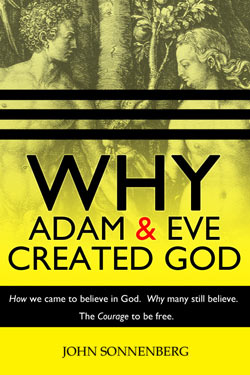Faith vs. Reason
Why Adam and Eve Created God is about reason. It describes the reasons people believe in God, and the unreasonable ideas the world’s religions hold. Long ago religion was about reason and science. But now with the advances in science and our knowledge of the universe, most religions will tell you that a belief in God is about faith. God is not something that can be measured, but must be experienced. Muslims and a few other faiths still believe their holy books contain the secrets to the universe, but the western religions have given up using science. All religions use reason and logic to support their faith. The arguments for God are well-tuned and have been around for thousands of years, so to the average person, they sound reasonable – reasonable enough so that they continue to believe and think they have good reason to.
But reasonable people will also cringe at the logical flaws the thousands of different religions embrace. For those who want to understand the reasoning behind why people made their Gods and still believe, Why Adam and Eve Created God will logically and methodically illustrate where faith comes from and why people believe. The reasons are fascinating, and you will see why reasonable people still believe in God. Once you see the many reasons people believe, you will see that there is really no reason people should continue to believe. Not a single reason.
Virtually no renowned scientists have a faith in the God of the Bible. To those of us who look to experts when forming our opinions, this speaks loudly. Well-educated people who devote their life to studying the universe or the natural sciences do not hold onto a faith in God. To believers unwilling to use reason, they see a conspiracy. As my book shows, belief in God is natural and the reasons people do believe are very powerful, so we still find belief in God everywhere. And even a few very well educated people do believe in God. A very few, but it happens enough to give believers some hope that their faith is reasonable.
The physicist and author John Polkinghorne is often cited as proof that reasonable people can believe in God. He was a professor at Cambridge University and quit to become a Anglican priest. What he does prove is that religious influence is very powerful. No one is totally immune from its attraction. He’s made a lot of money selling books about religions and science, so with a vested interest in marketing his views about God and science, his faith in God may have additional motivation.
Why Adam and Eve Created God will will show you all the reasons people have this faith. If you think there is good reason to believe in God, you will find there are many reasons, but none have anything to do with supernatural causes, God, Jesus, or Mohamed. Even if you read about the God vs. Science debate from Polkinghorne, you will see that a scholar like him cannot explain God clearly. The metaphysics he makes up can sound reasonable to the believer, but he’s unable to show us any clear and concise reason to believe in God.
When you look at the thousands of religions found around the world, belief in any one of their Gods becomes so very unreasonable. Believers in each religion think are right, and it is their religion that is the true one. No religion has any proof they are right, and the evidence one faith uses to validate their faith in God is as weak as the next religion. When you think about it, faith in God is simply unreasonable. When you read my book, you’ll see the reasons and agree that We Created God for many reasons, and most of those reasons are no longer needed. The emotional reasons people cling to Gods are still here, but with education, everyone can learn how to put aside these emotions so they can lead a fulfilling life free of superstitions.
As contributor Lanre told me: “Now I believe that the only logical thing that comes after a man’s death is what has been before his birth – ABSOLUTELY NO CONSCIOUSNESS. Billions have died before us and yet there is no proof a single one of them is still alive anywhere. “ My book will look at the supposed “evidence” of God and an afterlife, and you will see that every single bit of evidence disappears as soon as you look hard at it. To the believer this is a bit hard to believe because so many people they trust have told them God is everywhere and there is evidence all around us. Its is taken as a matter of faith that God is here. But when you take the time to study the evidence that there is a God, you will be suprised because there is nothing to even examine. All there are is ancient stories and silly mind tricks. Try to find just one simple piece of evidence that the God described in the Bible is doing what He is supposed to be doing, and you cannot find one single item to study. Nothing to even try to look at.
